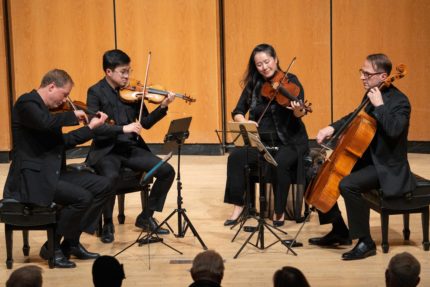Seasonal shades of light and dark from New Orford strings at Winter Chamber Festival

Light and its opposites — darkness, heaviness and a touch of claustrophobia — were the prevailing themes of the program that Quebec, Canada’s New Orford String Quartet brought to Pick-Staiger Concert Hall in Evanston on Sunday afternoon.
One of six elite groups tapped for Northwestern University’s ongoing Winter Chamber Music Festival, New Orford began their concert with a 2016 piece, Oblique Light, written by a compatriot of theirs, Ottawa-based composer Kelly-Marie Murphy. The most literal expression of the program’s underlying theme, Murphy’s chamber work evoked the various ways one experiences light in a Northern climate, from the blazing sun reflected off powdery snow to the diffuse light peeking through leaves in a forest.
One certainly felt the coldness of the wintry light with the piece’s stark opening and sharp, syncopated accents. But the dense and dissonant textures that characterized much of the rest of the score sometimes made the players sound out of tune and muddied. Oblique Light was at its evocative best in its sparer sections — the opening motif and, later, the sighing folk tune in the first violin, played expressively by Andrew Wan over a mottled-light effect rendered by staccato lower strings.
“Light” and “dark” were more relative in the next selection, Bartók’s esoteric String Quartet No. 4 in C Major. Pairing the Bartók with Oblique Light demonstrated the Hungarian composer’s influence on Murphy, from the dense atonalities to extended techniques such as the “Bartók pizzicato,” in which a player snaps a string with enough force to produce a percussive ricochet off the fingerboard.
As in Oblique Light, the crowded dissonance of the first movement came across as a bit heavy-handed in execution, and specific voices of importance proved difficult to discern through the murk. The fog lifted in the second movement, however, and the use of mutes throughout was a balm to ears clamoring for more clarity and detail.
In the central slow movement, cellist Brian Manker impressed with his expressive interpretation of the melancholy pastoral folk tune of the tárogató, a Hungarian single-reed woodwind instrument. Working through notes and lines disjointed by their use in an unusual modal scale, Manker was able to make lyrical sense of the melody and deliver one of the highlights of the piece.
The fourth movement mirrors the second in the quartet’s symmetrical structure, serving as a palate cleanser in its continual use of pizzicato before the tour-de-force of the final movement. Although echoing the first movement in affect, tempo, and even musical material, the final movement was altogether cleaner than the first as the New Orford brought the quartet to an energetic conclusion.
In the second half, Schubert’s String Quartet No. 15 in G Major provided a welcome balance to the heaviness of the first half. Here the theme of light and dark manifested in the surprising shifts in tonality between major and minor that occur throughout the work. Though the piece has an anxious undercurrent throughout, the New Orford’s performance on the whole was brighter and more relaxed than the first half.
For the Schubert quartet, violinist Jonathan Crow switched places with Wan to play first violin. Where Wan was a more demonstrative leader in the first half, Crow was more understated and nuanced in his approach, allowing all four players an equal role in the musical interpretation and dramatic propulsion of the piece.
Standout moments included the numerous cello solos, whose beautiful Schubertian melodies Manker played with suitable relish. Violist Sharon Wei was also finally able to come to the fore with a brief solo in the first movement, though she was somewhat overshadowed by the tremulant countermelody in the first violin.
Written in the unseasonably cold spring of 1826 when Schubert barely had enough money to support himself in Vienna, let alone travel with his friends in the countryside, the quartet is suffused with the composer’s stir-craziness. Like a dog pawing at the back door, it is unrelenting in its shivering, anxious tremolos. Listening to the quartet, one can imagine how tiring it must be to play, but the New Orford gave no hint of flagging in energy during the exciting tarantella-like finale.
The 26th Winter Chamber Music Festival continues on Friday, January 20 with the Horszowski Trio playing Smetana’s Trio in G Minor, three new trios inspired by Robert Schumann, and Schumann’s Trio No. 1 in D Minor. https://www.music.northwestern.edu/events/category/winter-chamber
Posted in Uncategorized

